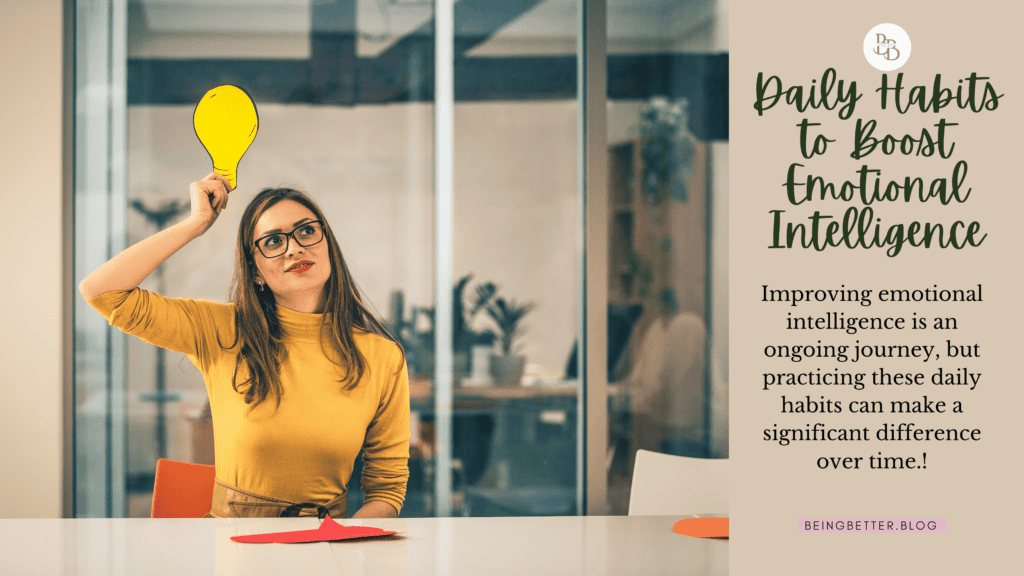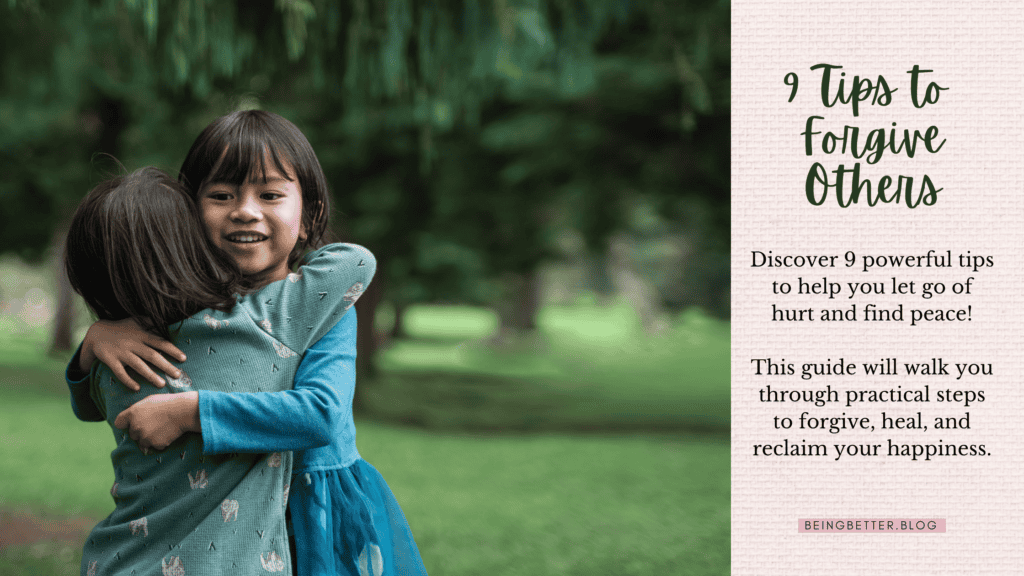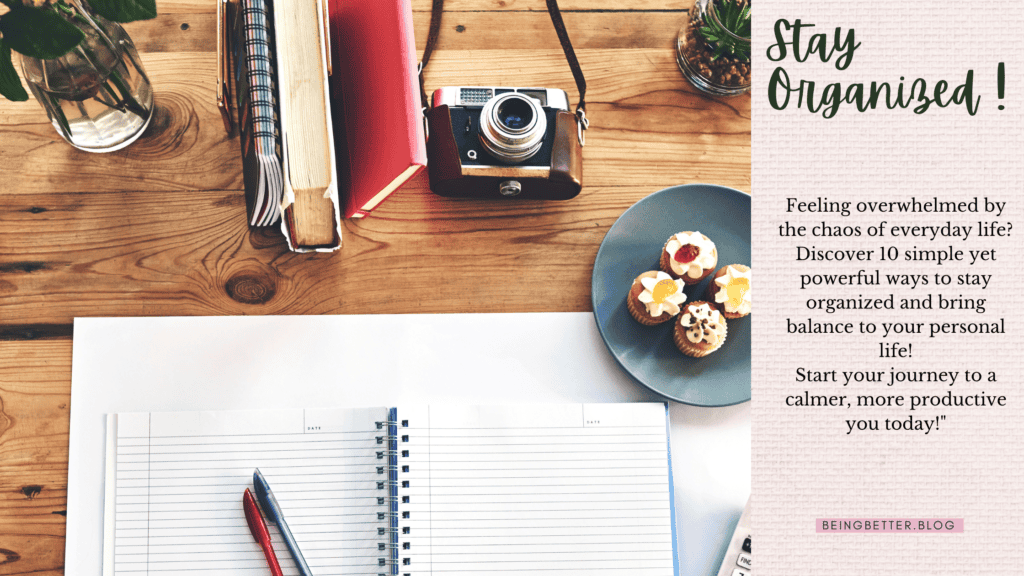Table of Contents
Daily Habits to Boost Emotional Intelligence
Welcome to another article of Beingbetter!
Ever had one of those days when your emotions felt all over the place?
Maybe you reacted too quickly to something and later wished you’d handled it differently (I struggled with this for many years before I started working on Emotional Intelligence).
Or perhaps you struggle to understand why certain things trigger you so much.
Trust me, you’re not alone!
Emotional intelligence (EQ) is all about understanding, managing, and using our emotions in a way that helps us rather than holds us back.
In this guide, I’ll share some simple yet powerful daily habits that have personally helped me become more emotionally aware, resilient, and peaceful.
Whether it’s practicing self-reflection, setting emotional boundaries, or spreading kindness, these small changes can make a big impact over time.
1. Self-Awareness Habits
Being aware of our emotions is the foundation of emotional intelligence.
The more we understand our feelings, the better we can manage them and respond to life’s ups and downs.
There are three simple self-awareness habits we can practice daily to strengthen this skill.
Self-Reflection
Self-reflection is like having a heart-to-heart conversation with ourselves.
It helps us slow down, process our emotions, and gain clarity on our thoughts and reactions. Taking just 5-10 minutes at the end of the day to reflect on how we felt can make a huge difference in our emotional awareness and overall well-being.
How to Practice Daily Self-Reflection
1️⃣ Find a Quiet Moment: Set aside time before bed or during a peaceful part of your day. A cozy corner with a warm cup of tea or a relaxing walk can make this habit even more enjoyable.
2️⃣ Ask Yourself Reflective Questions:
What emotions did I experience today? (Happiness, frustration, anxiety, excitement, etc.)
What triggered these emotions? (A situation, a person, a thought?)
How did I react to these emotions? Was my reaction helpful or something I’d like to improve?
What could I have done differently to manage my emotions better?
3️⃣ Write It Down: Keep a small notepad or use a notes app on your phone to jot down your thoughts. Tracking your emotions over time can help you identify patterns, emotional triggers, and progress in your self-awareness
I started journaling my emotions few months ago, and it has been truly eye-opening.
Looking back at past entries, I can see how my understanding of myself has grown.
I now notice certain triggers more quickly and can manage my responses better.
Even on tough days, writing things down helps me process my emotions instead of holding them in.
By making this a daily habit, you’ll start seeing positive changes in your emotional intelligence, decision-making, and even relationships.
Mindfulness Practice
Mindfulness is all about staying present and aware of our thoughts and emotions without getting lost in them.
Simple activities like deep breathing, meditation, or even listening to calming music can help ground us in the moment.
Whenever you feel overwhelmed, try this: take three slow, deep breaths and focus on what’s around you—what you see, hear, or feel. This quick reset can help you detach from stress and gain clarity on your emotions.
Practicing mindfulness, especially during stressful situations, gives us a moment to pause and process emotions before reacting.
It prevents those impulsive responses we might later regret and allows us to respond with more intention and self-control.
The more we practice, the better we get at managing emotions in the heat of the moment!
Journaling Your Emotions
Keep an “Emotion Journal” and write down what made you happy, frustrated, or anxious.
Example: I felt irritated when my coworker interrupted me. Why? Because I felt disrespected. How can I handle this better next time?
Over time, you’ll notice emotional triggers and learn how to manage them.
Whenever I have my phone, I type out my emotions in a chat, almost like talking to myself. For example, “I feel angry at my boss because she…” or “I’m disappointed by a stranger’s behavior because…” or “My partner is irritating me because…” Then, I ask myself how to handle these emotions wisely—finding a way to manage them without hurting myself or others.
This approach has significantly improved how I navigate difficult situations, allowing me to handle them more effectively and with greater composure.
2. Self-Regulation Habits
All the previous habits were meant to make us aware of our emotions.
Once we aware of our emotions, the next step is learning how to manage them effectively.
These 3 practices are very meaningful and really helpful.
Pause Before Reacting
When emotions run high, it’s easy to react impulsively—only to regret it later.
Instead, train yourself to pause before responding.
The next time you feel triggered, take a deep breath and count to five in your head.
This simple habit gives your mind a moment to process the situation before you say or do something you might later wish you hadn’t.
By taking a brief pause, we gain control over our emotions instead of letting them control us.
It’s a small change, but one that can make a big difference in your relationships, decision-making, and overall emotional intelligence.
Give it a try—you’ll be amazed at how much more composed and confident you feel!
Practice Gratitude
Gratitude is a simple yet powerful habit that can transform your mindset and bring more positivity into your life.
Start or end your day by listing three things you’re grateful for. (or you can write down as many as you want).
They don’t have to be big—small moments of joy matter, too!
Examples:
✅ I woke up feeling refreshed and peaceful this morning.
✅ A friend sent me a kind and thoughtful message.
✅ I’m grateful for my health and the strength it gives me every day.
By focusing on gratitude, you naturally shift your perspective from what’s missing to what’s already abundant in your life.
I’ve also realized that being thankful for everything we have—and even for what’s yet to come—creates a sense of peace and attracts more positivity into our lives.
Try it, and you’ll see how this simple habit brings more joy and fulfillment!
Set Emotional Boundaries
Your emotional well-being is just as important as your physical health, and setting healthy boundaries is a key part of protecting it.
If someone in your life constantly drains your energy—whether through negativity, excessive demands, or emotional venting—it’s okay to limit interactions or establish clear boundaries.
Example: If a friend frequently calls to complain and leaves you feeling exhausted, try saying, “I care about you, but I need to take care of my well-being too. Let’s talk about something uplifting or find solutions together.”
Setting boundaries doesn’t mean you don’t care about others—it simply means you’re prioritizing your own mental peace.
You don’t have to feel guilty for protecting your energy!
Recognizing when to step back from emotionally draining situations is a sign of emotional intelligence and self-respect.
By enforcing healthy limits, you create space for more positive, fulfilling relationships and avoid unnecessary stress.
Remember, saying no to what harms your peace is saying yes to your happiness!
3. Motivation Habits
Being emotionally intelligent means staying motivated even in the face of challenges.
Set Small Emotional Goals
Just like setting goals for your career or health, you can set daily emotional goals to strengthen your emotional intelligence.
Each morning, take a moment to decide how you want to navigate your emotions for the day.
Examples:
✅ Today, I will remain patient, even in frustrating situations.
✅ I will replace negative thoughts with positive affirmations.
✅ I will practice kindness and avoid judging others.
By consistently setting these small yet powerful intentions, you gradually train your mind to respond with awareness, patience, and positivity.
Over time, this practice rewires your thinking patterns, making it easier to stay emotionally balanced and resilient in any situation.
Positive Affirmations
The way you talk to yourself shapes your mindset and emotional resilience.
Positive affirmations are powerful statements that help rewire your brain for self-control, confidence, and emotional balance.
By repeating them daily, you reinforce positive thinking patterns and strengthen your ability to handle emotions wisely.
Examples of affirmations:
💬 I am in control of my emotions—they do not control me.
💬 I choose to respond with kindness, patience, and understanding.
💬 I am strong, capable, and able to handle challenges with grace.
Make affirmations a part of your morning routine, journaling, or even moments of stress.
Say them out loud, write them down, or repeat them in your mind throughout the day.
Over time, these simple yet powerful words will shift your mindset, helping you react to life’s ups and downs with greater emotional intelligence and inner peace.
Engage in Joyful Activities
Find simple yet meaningful activities that uplift your mood, reduce stress, and restore your inner peace.
It could be reading a good book, experimenting with new recipes, exercising, dancing to your favorite music, or taking a quiet walk in nature.
For me, caring for my indoor plants brings a deep sense of happiness. Watching tiny sprouts emerge, watering them, and capturing their beauty in photos fills me with a sense of accomplishment and peace.
These small moments of joy keep me grounded and help me navigate daily life with a calm and positive mindset.
Prioritizing joyful activities isn’t just about having fun—it’s a way to nurture your emotional well-being and keep your mind refreshed.
So, what brings you joy? Make it a daily habit!
4. Empathy Habits
Understanding others’ emotions is key to emotional intelligence. These habits will help you develop empathy.
Active Listening
Truly listening to someone is more than just hearing their words—it’s about being present, understanding their emotions, and making them feel valued.
Emotionally intelligent people practice active listening by giving their full attention to the speaker, rather than thinking about what to say next or rushing to respond.
How to practice active listening:
✔ Be fully present—put away distractions and focus on the person speaking.
✔ Avoid interrupting—let them express their thoughts without cutting in.
✔ Show empathy—use phrases like “That sounds really tough. How do you feel about it?” or “I hear you, and I understand why that was difficult.”
✔ Pay attention to non-verbal cues—body language and tone can reveal emotions beyond words.
When you listen actively, you build deeper connections, gain trust, and strengthen relationships.
Put Yourself in Others’ Shoes
One of the most powerful habits of emotionally intelligent people is the ability to see beyond their own perspective and consider what someone else might be going through.
Instead of reacting instantly, take a moment to ask yourself:
🔹 Could they be dealing with stress, frustration, or personal struggles?
🔹 Is their behavior a reflection of something deeper rather than directed at me personally?
For example, if a coworker is rude or dismissive, rather than getting upset, remind yourself that they might be overwhelmed with work, facing personal issues, or simply having a bad day.
This shift in mindset allows you to respond with compassion rather than frustration.
Since I started practicing this, I’ve noticed a huge improvement in how I handle difficult interactions.
I no longer take things personally, and instead, I try to understand before reacting.
This has not only helped me stay calmer but has also strengthened my relationships with others.
By developing this habit, you’ll naturally become more patient, kind, and emotionally intelligent in your daily interactions.
Perform Small Acts of Kindness
Kindness doesn’t have to be grand—it’s often the small, thoughtful gestures that leave the biggest impact.
A genuine compliment, a heartfelt message, or simply holding the door open for someone can brighten another person’s day and strengthen emotional connections.
Even the simplest acts of kindness matter.
Whether it’s offering a listening ear, sharing words of encouragement, or lending a helping hand, these gestures not only make others feel valued but also enhance your own sense of fulfillment.
For me, nothing feels more rewarding than seeing someone smile because of something I did. That feeling of warmth and peacefulness is unmatched.
The more kindness you spread, the more it comes back to you in ways you never expect
5. Social Skills Habits
Emotional intelligence is also about managing relationships effectively.
Observe Non-Verbal Cues
Communication isn’t just about words—body language, tone of voice, and facial expressions often reveal more than what’s being said.
Paying close attention to these non-verbal signals can help you understand how someone truly feels, even when they say otherwise.
For example, if a friend insists they’re “fine” but their voice sounds strained or their expression seems off, gently ask, “Are you sure? You seem a little down.” This simple act of noticing and acknowledging emotions fosters deeper connections and shows that you genuinely care.
By tuning into these subtle cues, you’ll not only improve your relationships but also develop a stronger sense of emotional awareness in social interactions.
Practice Open Communication
Clear and honest communication is key to building strong relationships.
It’s important to express our thoughts and feelings openly while also respecting how others feel.
For example, instead of saying, “You always ignore me!”, which might sound accusatory, try rephrasing it in a way that focuses on your emotions: “I feel hurt when my messages go unanswered. Can we talk about it?” This approach encourages understanding and a more constructive conversation.
By practicing open communication, we create a space where both we and others feel heard, valued, and respected.
The more we do it, the easier it becomes to navigate difficult conversations with kindness and clarity!
Surround Yourself with Emotionally Intelligent People
They say we become like the people we spend the most time with, so why not surround ourselves with those who handle stress, conflicts, and relationships with grace?
Being around emotionally intelligent individuals allows us to see firsthand how they navigate tough situations—how they stay calm under pressure, communicate effectively, and manage their emotions.
Pay attention to how they respond to challenges and conflicts.
Do they take a deep breath before reacting?
Do they listen before speaking?
Learning from their example can help us strengthen our own emotional intelligence.
The more we engage with people who model emotional awareness and maturity, the more these habits naturally become part of our own lives!
That’s all, dear Beauties!
Improving emotional intelligence is an ongoing journey, but practicing these daily habits can make a significant difference over time.
Start small, stay consistent, and you’ll notice improvements in your emotions, relationships, and overall well-being. Consistency is key!
You won’t see results in just a day or two, but over time, these small changes will elevate your emotional intelligence. I started this journey about four months ago, and I can see the difference—yet I’m still growing. So, be patient with yourself! Wishing you the best on your journey!
Also Read:



